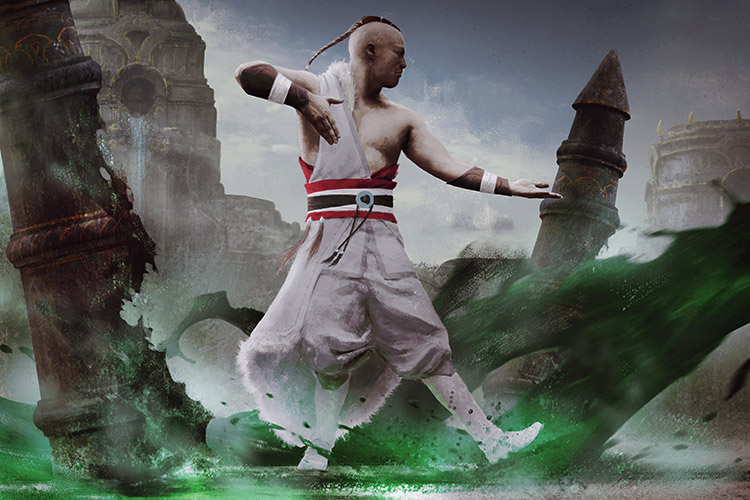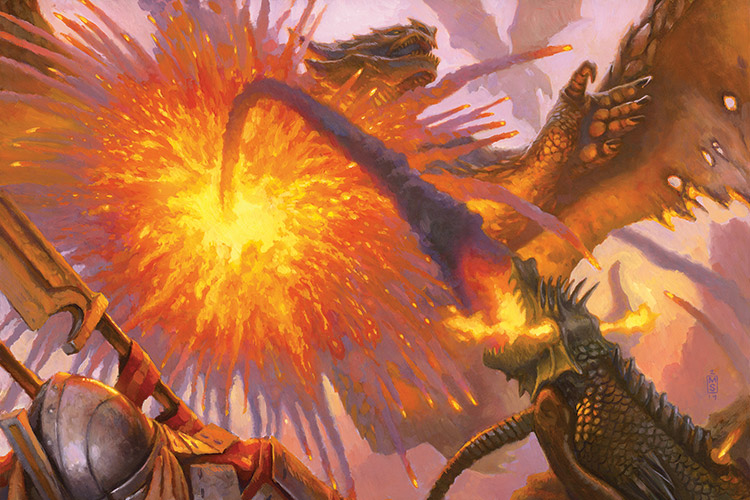Going Through the Motions
Everything matters in Magic. Everything.
Consider this tragic tale:
Player A: "I'll cast Silumgar's Command to bounce your Island and give your Dromoka Warrior -3/-3."
Player B: "I'll cast Center Soul to save my Dromoka Warrior."
Player A: "What color are you choosing with Center Soul?"
Player B: "It doesn't matter, I guess I'll choose blue."
Player A: "Okay, Dromoka Warrior now has protection from blue. A creature with protection from blue can't be enchanted by blue Auras, so the Jeskai Runemark that had been attached to your Dromoka Warrior falls off."
This is a true story. I know it to be a true story because I was the poor sap casting the Center Soul and losing my Jeskai Runemark. I lost the game in a painful and embarrassing fashion because of that mistake. Nonetheless, looking back, I'm glad that it happened the way it did because it taught me a valuable lesson. It taught me that every decision I make matters.
Or, to put it more precisely, you never know which of your decisions is going to matter. Therefore, you have to behave as though each and every one of them is important. When I cast Center Soul to save my creature from Silumgar's Command, I had a choice between giving my creature protection from blue or giving my creature protection from black. I had to decide, and yet I didn't treat it as an important decision. Because of that, I made it incorrectly and it cost me the game.
Even if not for the Jeskai Runemark, this type of decision can matter. What if my opponent was planning to attack me with a black creature later in the turn. I could block it safely if I'd named black. What if my opponent had the option to follow up the Silumgar's Command with a sorcery-speed black removal spell like Rite of the Serpent. I would take that option away if I'd named black. By treating my decision as unimportant, I'm ignoring all of these possibilities, which might be important to the outcome of the game.
Today's article is dedicated to going through the motions, by which I mean being precise and careful with absolutely every decision in a game of Magic, even the small ones. I'll go over the proper way to "go through the motions." More importantly, I'll try to convince you why it's a good idea to go through the motions yourself, and also to insist that your opponents go through the motions as well.

Jeskai Runemark | Art by Jaime Jones
The Proper Way to Cast a Spell
I had to decide what color to name with Center Soul. It was a good idea to make a careful decision. It would make me a better Magic player if I treated small decisions like that with respect. But, in this case, I actually mean it literally: I had to decide.
I broke the rules when I originally cast the Center Soul. By not choosing a color, I skipped a step—a decision—in the resolution of my spell. This is not the proper way to cast a spell and it's illegal to do it this way. This is not to say that what I did makes me a cheater or a villain, or that I deserve to be burned at the stake. However, anyone with the goal of being a tournament player should get in the habit of casting their spells exactly as the rules dictate, and they should insist that their opponents do the same.
Here's the proper way to cast a spell:
- Announce your modes and any alternate costs or additional costs. If you're casting a Command, be like Player A (from above), "I'll cast Silumgar's Command to bounce your Island and give your Dromoka Warrior -3/-3." If you want to reveal a Dragon with your Foul-Tongue Invocation, put the two cards onto the table simultaneously, or otherwise have your opponent acknowledge what card you're revealing. If you're casting Crater's Claws, announce how much mana you're going to spend on "X."
- Announce your targets for the spell.
- Distribute any effects that must be distributed. "I'll cast Pyrotechnics to deal 1 damage to Dromoka Warrior, 2 damage to Herald of Dromoka, and 1 damage to you."
- Pay the cost of the spell. Usually this will just mean tapping your lands. If you had mana in your mana pool already from another source, announce how much you're using, and how much (if anything) you still have left. If a spell has additional non-mana costs—like Collateral Damage—pay those as well.

Center Soul | Art by Igor Kieryluk
The order in which you do the above doesn't matter. The only important thing is that you do them in their entirety. You cannot take some of the steps of casting a spell without taking them all. You cannot take some of the steps of casting a spell, pause to see your opponent's reaction, and then take the rest of the steps. You must cast your spell completely and properly before your opponent is allowed to respond and before the game can continue.
(Note that with Center Soul, you actually choose your color when the spell resolves, not when you cast it).
Develop the habit of casting your spells like this, and insist that your opponents do the same. If you react (either an in-game response or simply with your body language) to your opponent's spell before they've paid all of the costs and made all of their decisions, then you're giving them an advantage. You're allowing them to have more information for their decisions than the rules would otherwise allow. Sometimes this won't matter. But as I've mentioned, you never really know when it might matter. So behave as though it matters!
Consider this example:
Player A is at 3 life.
Player B says, "Pyrotechnics." And reveals the card from his or her hand.
Player A casts Ojutai's Command to gain 4 life and draw a card.
Player B says, "Okay, well I wanted to deal 3 damage to you and 1 damage to your Dromoka Warrior." Now Player B decides which of his or her lands to tap for Pyrotechnics with the additional information that Player A is going to cast Ojutai's Command in response.
Simply put, this is a messy situation. Both players should work hard to avoid incidents like this. Player B cast their spell improperly, and Player A allowed the game to continue instead of insisting on going through the motions. These two things combined to give Player B an unfair advantage, and could potentially influence the outcome of the game.
It's Not Over Until It's Over!
In the past, I've advised against conceding and against worrying about "slowrolling." This is simply one more aspect of going through the motions. The game isn't over until one player officially loses or concedes. Until then, your decisions matter. You should make them precisely and carefully.
To return to the Pyrotechnics example, if you're Player B (casting Pyrotechnics), you should first consider everything that might go wrong and cause you to not win the game. Could your opponent counter Pyrotechnics? Could he or she gain life? How much life? What will happen if you don't win on the spot? How will you deal the last few points of damage? Is there a safer way to go for the win?
Now let's say you've considered all options and decided to indeed cast the Pyrotechnics. Now you need to be precise and careful about all of the decisions involved in casting your spell. Should you do it before or after you attack? How should you distribute the damage (in case something goes wrong)? What lands should you tap for it?
If you're Player A, facing down the lethal Pyrotechnics, you should first make sure your opponent has cast their spell properly. Have they distributed the damage? Have they tapped their lands? Only after you've confirmed this should you react, or even acknowledge that the spell has been cast.
If you have the Ojutai's Command, great! You'll survive the turn, but make sure you do so in the most favorable possible way. You know you'll be gaining 4 life, but what second mode should you choose? What lands should you tap? It might seem irrelevant, but what if you draw a white instant only to find that you foolishly tapped all of your Plains!?
If you don't have Ojutai's Command, you might be in trouble. But don't just concede in a huff! Survey they board, maybe there's something you're missing. Do you have Anticipate in your hand? Is there anything you might draw into to save you? The answer to these questions might be "no," but it doesn't cost you anything to take a final look and try to find a way out.

Pyrotechnics | Art by Matt Stewart
Every Decision Matters
I play Magic with the mindset that every decision matters. Should I play my Island or my Polluted Delta on the first turn? I have Silumgar's Scorn in my hand, so I'll want access to two blue mana as quickly as possible. But what if I draw Bile Blight? Do I have enough information to know what land I'll want to get with Polluted Delta? What changes if my opponent Thoughtseizes my Silumgar's Scorn? Which would be better to have in play if my opponent Thoughtseizes my Silumgar's Scorn and then I draw Temple of Deceit on turn two?
It's unlikely that this decision will influence the outcome of the game, but it's not impossible. Since you don't know for sure, it's in your best interest to treat the decision with respect.
Similarly, what about when you have lots of lands in play and you're casting a cheap spell. If it's Hero's Downfall, tap your Swamps and a Radiant Fountain, and leave your Temple of Deceits and Dismal Backwaters untapped. Maybe you don't even have a blue spell in your hand, but your opponent doesn't know that! If you treat the decision as unimportant, you might be unintentionally giving away information. Once in a while you might just be able to Anticipate into Dig Through Time, and Dig Through Time into another Dig Through Time, but you might give up on this possibility if you needlessly tapped too many of your blue-producing lands.
How to sequence your plays is another category of decisions that seems small, but can often be important. Proper sequencing is largely about managing information: giving yourself the most information with which to make decisions, and concealing as much information as possible from your opponent when he or she makes decisions. Once in a while, proper sequencing can help you to make a better decisions or lead your opponent into making a worse decision. Either of these things can change a loss into a win, so proper sequencing is certainly worth your effort!
Don't Drive Yourself Nuts!
Treat every decision, even the small decisions, with respect. That said, don't go overboard. Magic is a game and ought to be fun. Even with the competitive backdrop of a tournament, you still want to have fun and your opponents still want to have fun. Moreover, in tournaments you have additional pressures on you to play quickly so that you don't run out of time to finish your matches.
In other words, don't agonize over your small decisions so much that it ruins the game for you. Don't burn yourself out; you don't want your brain to be fried by turn four of the first game of the tournament! Don't slow down your pace of play so much that you can't finish your matches.
Each choice you face, just take a quick second to make sure you're not missing anything, make the best decision you reasonably can, and go with it. More importantly, try to develop habits that allow you to make your small decisions slightly better and slightly faster. (Like tapping your basic lands and keeping your dual lands untapped). There will be times when you need to deviate from your habits but, with experience, you'll come to identify and understand those times a little better.

